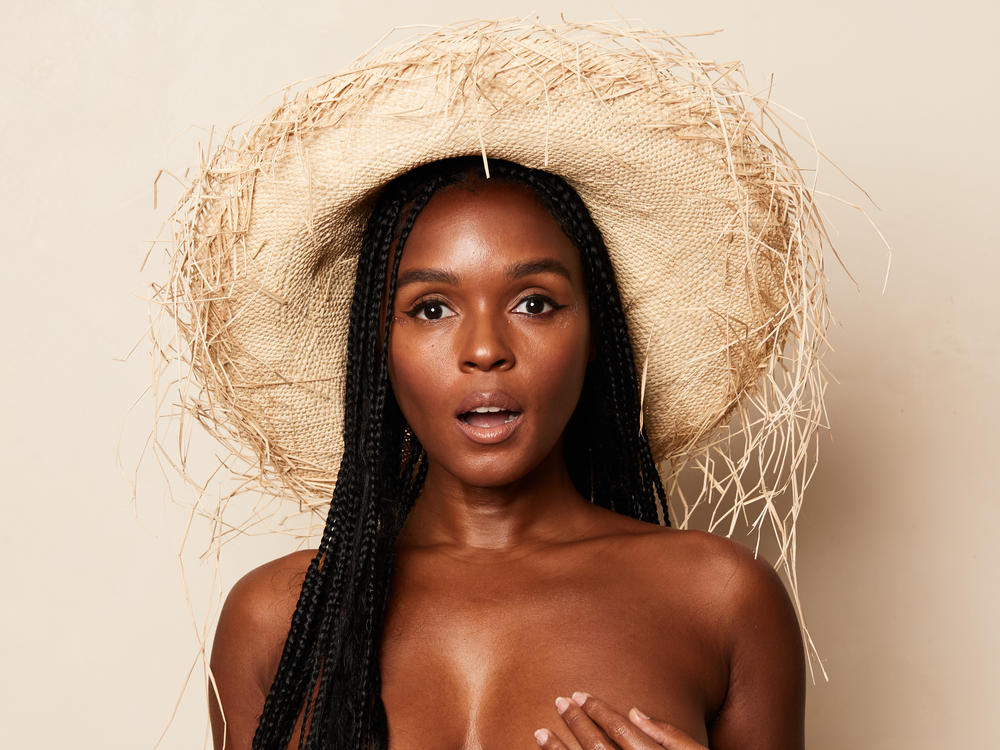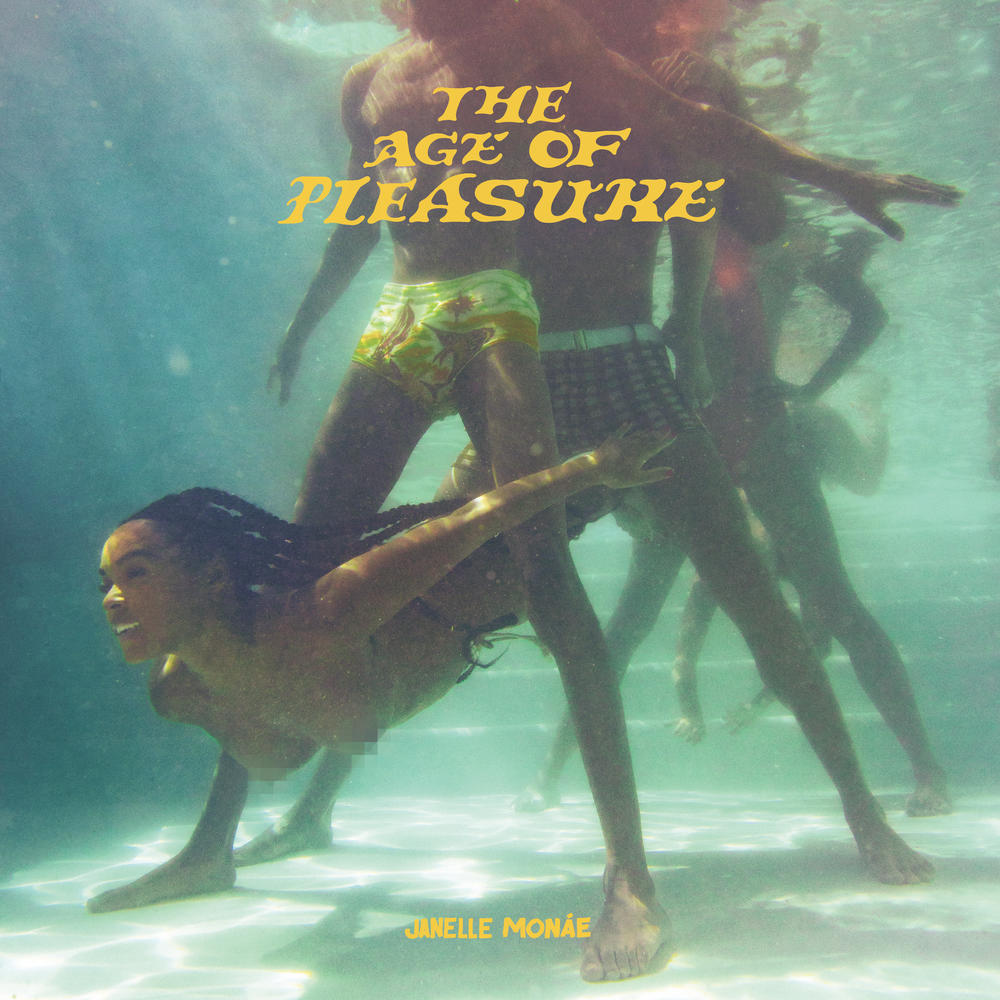Section Branding
Header Content
Janelle Monáe wants you ... to enter the 'Pleasure' zone
Primary Content
In the already uncomfortably hot summer of 2023, talk of pleasure can hit like a forbidden tonic, providing relief from a steady diet of grief, outrage and anxiety. Janelle Monáe's new album The Age of Pleasure presents itself as both that stimulant and a guidebook, a compact compendium of fantasies and pep talks designed to encourage listeners to relax into the dopamine-rushed present tense. "If I could f*** me right here right now I would do that," the singer-actor-conceptualist turned libertine lifestyle coach sings in "Water Slide," a reggaefied mid-record romp that plays with swimming metaphors — backstroke, freestyle, surfing on the thing like it's high tide —to invoke a tipsy kind of arousal that lingers delightfully, requiring no release. A floating feeling, like being drawn into a swimming pool's lazy river. Or like getting intimate without an end goal in mind, in a safe space with someone you love. "I could spend the whole day in it," Monáe swoons, and by "it" she means pleasure itself.
In Monáe's world pleasure means some obvious things — material comfort, self-love, carefully maintained ties with intimates and an open-ended approach to alluring strangers. Musically, these values find expression in a certain cadence, that clavé groove that unfolds the way sexual excitement does, slowing time down and speeding it up all at once. Monáe and her collaborators in the Wondaland Arts Society ground The Age of Pleasure in the complex yet accessible rhythms of Afrobeats (some prefer Afropop), the diasporic dance music that shares sonic borders with global Latin pop and Caribbean riddims. Afrobeats is the ground of much current mainstream pop, recasting hip-hop on the global stage in ways that are both historically minded — the presence of Nigerian scion Seun Kuti and Egypt 80 on this album accomplish that goal — and au courant. Monáe queers the trend with lyrics that celebrate same-sex encounters and polyamory and by filling Pleasure's songs with quick turns, interludes and echoes, creating a sinuous inflorescence evocative of many women's responsive patterns and the polymorphous attention blur of a friendly orgy.
If this sounds like a lot, Monáe and her collaborators make sure it goes down easy. The Age of Pleasure is just over 30 minutes long and its structure is clean and tight. Supposedly an autobiographical departure from her previous character-driven concept albums, this neat set still displays an actor's sensibility. It unfolds in three acts, with a bold opening, a complicated middle and a pleasing denouement. But unlike her earlier Cindi Mayweather trilogy, with its hugely detailed world-building and heady ideas about power, race and humanity itself, The Age of Pleasure is contained, naturalistic and circular. It's a round, a story that's not linear but grounded in an ebb and flow, again like a woman's sensuality — and in service of a utopian eroticism that runs on true mutual recognition.
True to her style and accommodating an instrument that's more chameleonic than stunningly distinctive, Monáe puts on many voices throughout The Age of Pleasure. The first four tracks are flexes, runway struts redolent of the ballroom (and, inevitably, Beyoncé's Renaissance). The dominant voice here is that of a haughty rapper who also likes to play. Monáe doesn't walk, she floats; she's on her champagne s***, phenomenal, so hot she's haute. This is the warm-up, the infusion of pride required to pursue pleasure without too much risk of being exploited. "I'm looking at a thousand versions of myself, and we're all fine as f***," Monáe spits over an avant-funk beat, ready to grab her besties and go on the prowl. Flipping a line from decadent Euphoria, she speaks up for seductiveness as a strength instead of a destabilizing element.
Her excursions occupy the album's middle and most interesting section, a set of mid-tempo grooves that turn inward to describe a queer experience of pleasure. An interlude featuring Saint Grace Jones murmuring in French sets up the section; then comes "Lipstick Lover," the summery reggae single that hovers in the air like a throwaway while establishing Monáe's all-important perspective. "I like lipstick on my neck," Monáe chants in the chorus, not only making clear that she wants queer fun but pointing toward erogenous zones that unseat Afropop and hip-hop's phallocentric tendencies. Even more effective is "The Rush," its half time dancehall riddim and airy harmonies sounding like what being turned on feels like, steadily yet sneakily intensifying on a wave of Monáe's murmurs with extra strokes from Amaarae and Nia Long. "I get that feelin'," she repeats, redirecting her thought processes below her neck over a bed of what the credits describe as "percolating freaquencies." Feeling becomes a way of thinking. Next comes "Water Slide," its drenched metaphors accentuating the music's body consciousness.
The final turn in The Age of Pleasure complicates pleasure by showing how it's a two- (or three-) way street that can get a little bumpy. The insistence of "Know Better," a lover's plea built around densely multi-tracked vocals from Monáe and Nigerian crooner Ckay, reminds the listener that pleasure demands consent. That song drifts right into "Paid In Pleasure," a sticky allegory that lets in some perversion, turning sex's sometimes transactional nature into a fetish. (Monáe's early mentor Prince would have enjoyed this one.) Our sensual hero recovers her wits on the final two tracks — the adorable ode to throupling "Only Have Eyes 42," which quotes a doo wop classic to swathe polyamory in innocence, and the brief, tender "A Dry Red," which shows that Monaé can do yearning as convincingly as she can pose or purr, and begins the album's cycle of awakening, pursuit and connection again.
For all its narrative flair, The Age of Pleasure is actually more about making space than telling a story, and that's why this album is more instantly beguiling than her previous releases, whose high concepts could result in a certain chilliness. Monáe has called this space an oasis, and its sheltering vibes are paramount. The album's rollout, via a Rolling Stone cover and the "Lipstick Lover" video, has centered on Wondaland West, the communal Los Angeles manse where Monáe is housemother, with its party-ready courtyard that Rolling Stone's Mankaprr Conteh described as "magnificent, with its tranquil pool in the center and troves of nooks, crannies, outdoor baths, and citrus trees" — an Eden where slipping away with a special someone is as possible as joining in on a group hug. During lockdown, in collaboration with the diasporic roving party Everyday People, Monáe began hosting gatherings. The Age of Pleasure reflects this communal experience, asserting that the only way pleasure can flower is in well-tended gardens where people can relax into themselves. For BIPOC and queer people, such places have often been difficult to find, and they are currently under siege. The Age of Pleasure establishes its utopia to illuminate the need for more mundane versions of it to multiply.
The term "pleasure zone" has different meanings; it designates sensitive parts of the body, but also spaces where people can step outside the grind of their daily lives and play. Postmodern theory names certain characteristics of these spaces: They are sheltering, flexible and whimsical, allowing visitors to try on customarily unavailable modes of being. Access to such spaces has often been denied BIPOC and queer people; the history of the swimming pool, Monáe's favorite metaphor, is stained with the blood of racist segregation. That's why imagining — and creating — such oases matters so much, and why, for all its lightness, The Age of Pleasure is profoundly political. As these songs move from Lagos polyrhythms to Atlanta hip-hop horns to variations on earlier pop twists on dance floor innovation like executive producer Diddy's long-lost project Dirty Money, The Age of Pleasure conjures a dream of frictionless fluidity where any fantasy might be pursued, any identity embraced, safely. The myriad images of water add to the feeling of escaping gravity — and it's definitely pool water, teal blue and protected from dangerous undertows, where a leg can press against a thigh on a floatie with no danger of pulling anyone under.
Janelle Monáe's supreme ability to contain herself, to meld with the roles she takes on, is her main strength and shortcoming as a performer. She has achieved much as an actress by disappearing into roles that require her to don disguises, help others disguise themselves, keep secrets and find power on the margins. Her music has sometimes lacked a strong charismatic center as she's pursued different characters and plotlines. On The Age of Pleasure she experiments with a new role — that of her own fine self, alive in a body and eager to feel as much as she can. This allows her to put aside the highly dramatic expressiveness to which she's not suited and instead dwell in that liquid experience of suggestiveness and seduction where gestures speak louder than words. Monáe still seems to resist intense emotions — heartache, for example, doesn't surface anywhere here, and despite all the kissing and licking and offers to keep her lovers coming, she doesn't hit any orgasmic notes herself. Instead, she and the Wondaland crew offer an alternative to all that: a wet dream of a better world.
Copyright 2023 NPR. To see more, visit https://www.npr.org.


